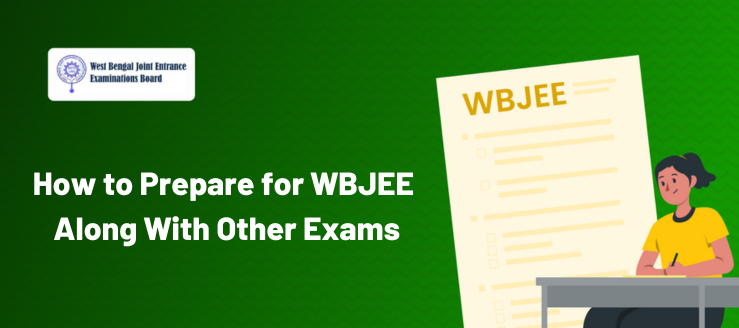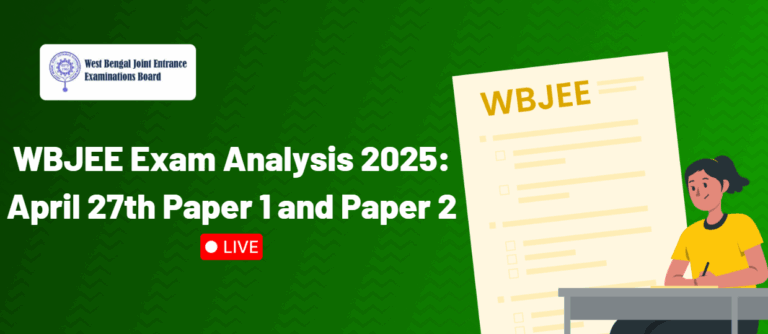Summarise With AI

Engineering aspirants preparing for entrance examinations like WBJEE, JEE and state-level entrance examinations face a lot of difficulties. Balancing the preparation for multiple exams simultaneously can be stressful, but with the right approach to time management, it is definitely achievable. In this article, we’ll discuss how to manage your time effectively between WBJEE and other entrance exams, so you can maximise your preparation and perform at your best.
1. Understand the Exam Schedules
Understanding the exam schedules of each entrance examination can help you strategise your preparation effectively. The exams like WBJEE and JEE Mains are often scheduled closely, which poses a challenge to candidates. A careful assessment of all exam dates is crucial to begin your preparation on the right note.
- Check the exam dates: Mark the exam dates to gain a clear picture of how to plan your study schedule.
- Identify Overlapping topics: Topics like Physics, Mathematics, and chemistry are almost similar for all the exams. However, each exam requires varying levels of preparation. Recognizing the overlap of subjects and topics helps you prepare smarter by saving time.
2. Read the Syllabus and Format of the Examinations
Understanding the syllabus and format of each exam is crucial to maximize your preparation and avoid unnecessary stress. Each exam has a specific structure, and knowing it in advance helps you plan your study schedule more effectively.
- Read the Syllabus Carefully: Familiarize yourself with the syllabus for each exam you are preparing for. Identify the key topics and subtopics included in the syllabus. This will help you ensure that you are covering all necessary areas and not missing out on any important concepts.
- Understand the Exam Format: Different exams have different formats, such as the number of sections, types of questions (MCQs, descriptive, etc.), and the marking scheme. Knowing the format helps you allocate your time effectively during preparation and get comfortable with the pattern of the exam.
- Align Your Preparation: Based on the syllabus and exam format, tailor your study plan to cover all topics. Prioritize the areas with higher weightage and ensure you are familiar with the exam pattern to optimize your performance.
3. Prioritize your Preparation Based on the Exam Requirements
Understanding the exam pattern and difficulty level of questions asked in each exam that you are preparing for is important to effectively prepare for all the entrance examinations.
- Analyse the difficulty level of the exam: Each exam demands a different level of preparation for the concepts asked in the exam. Understanding the difficulty level helps you prepare accordingly.
- Focus on Important Topics: Focus more on high-weightage topics that are common across exams. For example, topics like Mechanics, Thermodynamics, Organic Chemistry, and Algebra are common in both exams, so spending extra time on these areas will benefit you in both.
4. Examwise Subject priority
Each exam you prepare for may have different emphasis on certain subjects, so it’s important to identify the priority of subjects for each one. This will help you align your study plan to focus on the right areas based on the exam’s pattern and requirements.
- Focus on High-Weightage Subjects: Prioritize subjects with higher weightage in each exam, like Physics or Chemistry, to maximize your score.
- Target Overlapping Topics: Concentrate on topics common across exams to optimize your preparation and save time.
5. Create a Realistic and Flexible Study Plan
A well-structured plan ensures a smooth preparation. A plan that is overloaded with targets can be stressful. Curate a plan that is both comprehensive and adaptable.
- Divide your Day into study blocks: Divide your study time between subjects, but also remember to allocate specific hours for each exam. For instance, you can focus on WBJEE topics in the morning and JEE Main topics in the afternoon.
- Set realistic goals: Breaking your long-term plan into smaller chunks and focusing on them will make your preparation more manageable.
- Include Buffer Time: Some topics may require more time and you have to include some buffer days in order to complete them. This flexibility also helps in case of unexpected commitments.
6. Utilize Smart Study Techniques
Studying for longer hours is good, but the quality of study is more important than the quantity. There are many smart study techniques that will save you a lot of time and help you prepare effectively for the exams.
- Understand the concepts
- Attempt mock tests
- Use digital resources to save time.
7. Manage Stress and Stay Healthy
Preparing for multiple exams at the same time can build up a lot of mental and physical stress. The stress can affect your performance and hinder your preparation often. Here are some tips to manage stress while preparing for multiple exams.
- Avoid Burnout: Continuous study sessions without breaks can lead to burnout. Schedule regular breaks to relax and recharge.
- Get enough sleep: Never compromise on sleep. A well-rested mind is more focused and efficient than a tired one. Aim for at least 6-8 hours of sleep each night.
- Exercise and eat well: Physical activity helps release stress and improves concentration. Also, maintain a balanced diet to stay productive throughout the day.
- Practice relaxation techniques. Meditation, deep breathing exercises, or simply taking short walks can help calm your mind and reduce anxiety.
5 Exams to Attempt while Preparing for WBJEE
Here are some exams that you can attempt while preparing for WBJEE:
| S.no | Exam | Total Marks | Institutes Accepting | Mode of Examination | Date of Examination |
| 1 | JEE Mains & Advanced | 300 Marks | IITs, NITs, and other institutes. | CBT | January and April |
| 2 | BITSAT | 450 Marks | BITS Pilani, BITS Goa, BITS Hyderabad (Private Universities) | CBT | May and June |
| 3 | VITEEE | 360 Marks | VIT Vellore, VIT Chennai (Private University) | CBT | April |
| 4 | SRMJEEE | 360 Marks | SRM Institute of Science and Technology (Private University) | CBT | April |
| 5 | JELET | 100 | Engineering and Pharmacy institutions in West Bengal (Lateral Entry) | Pen and Paper | June |
Conclusion
Preparing for other entrance examinations along with WBJEE may seem challenging, but with a well-organized study plan, revision and smart study techniques, it is manageable. Focus on understanding concepts, practising mock tests, and maintaining a healthy routine to keep both your mind and body active. Remember, time management isn’t just about how many hours you study but how effectively you use those hours. With the right mindset, consistent effort, and smart strategies, you can ace both WBJEE and other entrance exams with confidence.
Also Check: WBJEE vs JEE Check Key Differences
Frequently Asked Questions
1. Can I prepare for WBJEE using the 12-class syllabus?
Although the class 12th syllabus majorly overlaps with the WBJEE syllabus, it is advised to stick to the syllabus officially released by WBJEEB on its official website.
2. Can I crack WBJEE in 30 days?
Although it is advised to start your preparation as early as possible, you can still prepare for WBJEE in 30 days, provided you have a strong foundation in your class 12th.
3. Which subject in WBJEE is the toughest?
Comparatively, Mathematics is tougher than physics and chemistry in WBJEE.
4. Can we expect repeated questions in WBJEE?
There are some instances of questions being repeated in WBJEE. So students can expect questions to be repeated or questions of similar kind to appear on the exam.
5. Is 75% criteria there in WBJEE?
WBJEE does not have any 75% criteria, unlike JEE Mains.






